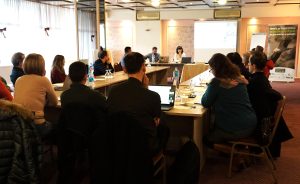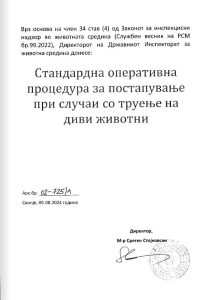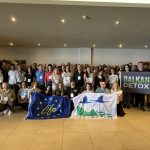 On August 5th, the State Environmental Inspectorate officially adopted the Standard Operational Protocol (SOP) for handling wildlife poisoning cases, developed as part of the BalkanDetox LIFE initiative. This important document was proposed during a meeting of the National Anti-Poisoning Working Group, where members highlighted the need for clearly defined roles and responsibilities among national bodies, as well as effective cooperation in such cases. In accordance with the Law of Inspection on the Environment, article 34 allows the Director to officially adopt such SOPs, with provisions for annual revisions if necessary.
On August 5th, the State Environmental Inspectorate officially adopted the Standard Operational Protocol (SOP) for handling wildlife poisoning cases, developed as part of the BalkanDetox LIFE initiative. This important document was proposed during a meeting of the National Anti-Poisoning Working Group, where members highlighted the need for clearly defined roles and responsibilities among national bodies, as well as effective cooperation in such cases. In accordance with the Law of Inspection on the Environment, article 34 allows the Director to officially adopt such SOPs, with provisions for annual revisions if necessary.
As North Macedonia currently lacks a fully systematized response to wildlife poisoning cases, this SOP marks a significant step forward. It will primarily support state environmental inspectors, while also providing guidance for police forces, veterinary inspectors, and public prosecutors.
“Proper management of wildlife poisoning cases is critical to ensuring a successful legal outcome. This includes the use of administrative tools such as preparing detailed reports from the inspection site, collecting evidence of identified violations, and maintaining formal communication with other relevant authorities. It also involves timely case reporting, thorough on-site investigations, transporting collected materials to appropriate laboratories for analysis, and initiating both criminal and misdemeanor proceedings against the perpetrators,” — Darko Blinkov, General Inspector of Environment, State Environmental Inspectorate
The document was the result of a collaborative effort involving the Macedonian Ecological Society, the State Environmental Inspectorate, the Faculty of Security, and the Macedonian Young Lawyers Association.
The document outlines the relevant national laws that establish the criminal framework for wildlife poisoning and the legal grounds on which national bodies must act in such cases. While it primarily serves environmental inspectors, it also details the responsibilities of various stakeholders, including the Food and Veterinary Agency, the police, relevant laboratories, the public prosecutor’s office, the State Hunting Inspectorate, as well as agencies managing protected areas and hunting ground concessionaires.
The SOP provides a step-by-step guide for inspectors, complete with diagrams and flowcharts to clarify procedures. The annexes include photographs of poisoned wildlife and common poison baits as reference material for inspectors. Finally, the document features sample reports that inspectors can complete during their investigations.
 “We are incredibly happy that as a result of the hard work and cooperation of the National Anti-poisoning Working Group, we were able to not only create this document but have it legally adopted by a relevant national body. This action shows commitment, generates motivation, and can further stimulate cooperation in solving wildlife poisoning issues and further to combat such wildlife crimes,” – Arta Starova, North Macedonia project coordinator of BalkanDetox LIFE.
“We are incredibly happy that as a result of the hard work and cooperation of the National Anti-poisoning Working Group, we were able to not only create this document but have it legally adopted by a relevant national body. This action shows commitment, generates motivation, and can further stimulate cooperation in solving wildlife poisoning issues and further to combat such wildlife crimes,” – Arta Starova, North Macedonia project coordinator of BalkanDetox LIFE.


